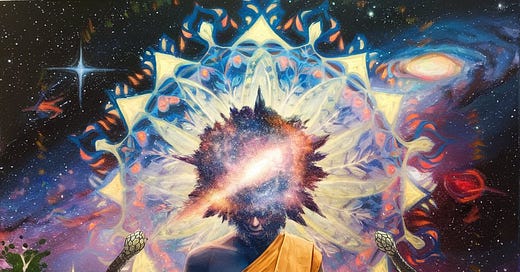God, Cosmos, and Reality in the Views of Spinoza, Non-Duality, Advaita Vedanta, and Dzogchen
The nature of God, the cosmos, and reality has been a central question across philosophy and spirituality. Traditions such as Advaita Vedanta and Dzogchen, alongside the philosophy of Baruch Spinoza, offer profound and overlapping insights into the unity of existence and the illusory nature of separation. These perspectives challenge dualistic conceptions of the divine, instead proposing a reality that is fundamentally unified, eternal, and indivisible.
Baruch Spinoza’s God: Deus sive Natura
Baruch Spinoza, a 17th-century philosopher, radically redefined God in his Ethics. His concept of Deus sive Natura (“God or Nature”) posits that God is not a transcendent being but rather the entirety of existence.
God as Infinite and Immanent
Spinoza rejected the idea of a personal, anthropomorphic deity. Instead, he described God as the infinite, eternal substance that constitutes and sustains all things. For Spinoza:
God and Nature Are One: There is no distinction between the creator and the creation. God is synonymous with the cosmos itself.
Immanence Over Transcendence: God is not external to the universe but exists within it as its fundamental essence.
Reality as a Unified Whole
Spinoza’s philosophy aligns with non-dualistic ideas by emphasizing the oneness of reality. He argued that:
All things are modes (manifestations) of the single substance (God/Nature).
Apparent distinctions between objects, beings, and events are ultimately illusory, as everything is interconnected and part of the same infinite reality.
Ethical Implications
Understanding God as Nature shifts the focus from worship to understanding. Spinoza believed that aligning with the rational order of Nature (God) leads to freedom, peace, and joy.
Advaita Vedanta: Non-Duality of Brahman
Advaita Vedanta, rooted in the Vedas and systematized by Adi Shankaracharya, presents a philosophy of non-duality (Advaita), emphasizing the oneness of Brahman (the ultimate reality).
Brahman: The Infinite and Unchanging Reality
Advaita Vedanta asserts that Brahman is:
Infinite, Eternal, and Unchanging: The only true reality that underlies all existence.
Impersonal and Formless: Beyond attributes (nirguna), Brahman cannot be limited by human conceptions.
Atman and Brahman
A cornerstone of Advaita is the realization that the individual self (Atman) is not separate from Brahman:
"Tat Tvam Asi" (You Are That): The individual soul is ultimately identical to the universal essence.
The sense of individuality is an illusion (maya), arising from ignorance (avidya). Liberation (moksha) is achieved by realizing this oneness.
Illusion and Reality
The material world appears real due to maya, but it is a temporary, changing manifestation of the eternal Brahman. This non-dual view echoes Spinoza’s idea that distinctions within reality are illusory.
Dzogchen: The Nature of Mind and Reality
Dzogchen, a tradition within Tibetan Buddhism, focuses on recognizing the primordial nature of mind and reality. It emphasizes the natural state of awareness, often referred to as the Ground or the Base (ka dag).
Primordial Purity and Spontaneous Perfection
In Dzogchen:
The Ground of all existence is primordially pure and unchanging. This Ground is akin to the Advaita concept of Brahman and Spinoza’s God as the infinite essence.
Reality is described as spontaneously perfect (lhun drub), meaning it is complete and whole in its natural state without need for alteration.
Rigpa: The Nature of Awareness
Dzogchen teachings emphasize recognizing Rigpa, the pure, non-dual awareness that underlies all experiences. When one rests in Rigpa:
The illusory dualities of self and other, subject and object dissolve.
One perceives the unity and interconnectedness of all phenomena, which arise as luminous expressions of the Ground.
Beyond Theistic and Atheistic Views
Dzogchen does not focus on a creator deity but on understanding the nature of existence itself. The cosmos is seen as a dynamic interplay of appearances arising from the Ground, free of fixed distinctions.
Non-Duality: Common Threads Across Traditions
1. Reality as Unified and Indivisible
Non-duality is the cornerstone of Spinoza’s philosophy, Advaita Vedanta, and Dzogchen. All assert that:
The apparent separation between entities is illusory.
Reality is a single, interconnected whole.
2. God Beyond Anthropomorphism
These perspectives reject the concept of a personal, anthropomorphic God:
Spinoza’s God is Nature itself.
Advaita’s Brahman is formless, attributeless, and beyond human comprehension.
Dzogchen’s Ground is not a deity but the essence of all that is.
3. Liberation Through Knowledge
Each tradition emphasizes liberation through understanding:
Spinoza saw freedom as aligning with the rational order of Nature.
Advaita advocates self-realization through the knowledge of Brahman.
Dzogchen teaches recognition of Rigpa as the path to liberation.
4. Illusion and Reality
Spinoza highlighted the illusory nature of distinctions between objects and beings.
Advaita teaches that the world of names and forms is a projection of maya.
Dzogchen views dualistic perceptions as delusions obscuring the true nature of the Ground.
Cosmos and Reality: A Shared Vision
These traditions share a vision of the cosmos as a manifestation of an underlying, unified reality:
Spinoza: The cosmos is an expression of God/Nature, infinite and eternal.
Advaita Vedanta: The universe is a projection of Brahman, appearing through maya.
Dzogchen: The universe arises as luminous, spontaneous expressions of the Ground.
Rather than viewing the cosmos as created by a ruler-God, these traditions see it as inherently divine, eternal, and non-dual.
Conclusion: God Beyond Control
The philosophies of Spinoza, Advaita Vedanta, and Dzogchen offer an alternative to hierarchical and institutionalized views of God and reality. They reject dualism, anthropomorphic deities, and centralized authority, instead presenting a vision of existence as unified, infinite, and fundamentally free.
These perspectives challenge us to move beyond rigid, power-based constructs of the divine and to embrace a deeper understanding of reality—one that dissolves separation, celebrates unity, and liberates the mind from the illusion of control.



